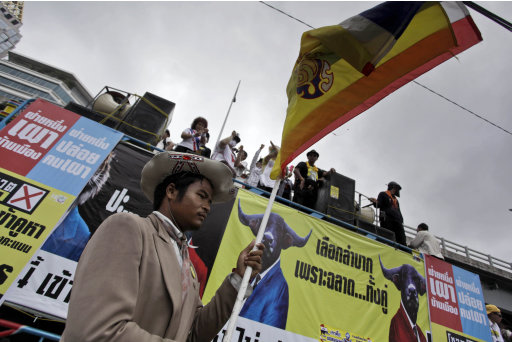Updated: 7/1/2011

Thailand's Yellow Shirt demonstrators, also know as the People's Alliance for Democracy, take to the streets in Bangkok Friday, July 1, 2011, on the final day of campaigning for Sunday's election. The... more

Puea Thai Party's Yingluck Shinawatra, flanked by an image of her brother, former Thai Prime Minister Thaksin Shinawatra, visits a learning center funded by the Thaicom Foundation while campaigning in... more
Thailand votes Sunday in an election seen as crucial to the future of the troubled kingdom. Here are some key facts about the country:
- GEOGRAPHY: A Southeast Asian country surrounded by the Gulf of Thailand, the Andaman Sea and Indian Ocean. Thailand borders Myanmar, Cambodia, Laos and Malaysia.
- AREA: 513,115 square kilometres (198,115 square miles)
- POPULATION: 67.8 million (2009, World Bank)
- CAPITAL: Bangkok
- RELIGIONS: Theravada Buddhism (94 percent), Muslim (four percent), Christian (one percent), other (one percent).
- HISTORY: Formerly known as Siam, Thailand is unique among its neighbours because it was never colonised. It has been a constitutional monarchy with a parliamentary government since a bloodless coup on June 24, 1932 overthrew the absolute monarchy.
After a period of political instability, the reign of current King Bhumibol, which started in 1946, ushered in an era of unprecedented economic prosperity until the Asian financial crisis of 1997.
During King Bhumibol's six decades on the throne there have been 24 prime ministers and 16 constitutions, along with a series of actual or attempted coups.
The popular tourist destination is deeply divided along class lines, with establishment backers and their rivals, supporters of populist former premier Thaksin Shinawatra, launching disruptive rival street protests since he was deposed five years ago.
In April and May last year, during rallies by his "Red Shirt" loyalists, more than 90 people were killed in clashes with the army.
- POLITICAL INSTITUTIONS: Thailand is a constitutional monarchy with a 500-member House of Representatives and a 150-member non-party Senate.
- ECONOMY: The economy doubled in size in both the 1970s and 1980s, and from 1986 to 1996 the average annual economic growth was a heady nine percent.
That blistering expansion continued until the 1997 Asian financial crisis and the subsequent devaluation of the baht currency.
The main Thai industries are tourism, agriculture, textiles, automotive, electronic components, cement and tungsten. Principal products are rice, sugar cane, tapioca, corn, bananas, pineapples, rubber, shrimp and chicken.
Thailand is heavily reliant on export markets in Europe, Japan and the United States and in 2009 saw its economy contract (by 2.3 percent) for the first time in more than a decade.
Despite last year's political turmoil, the economy was relatively resilient, with 7.8 percent growth in 2010.
- GDP: 263.77 billion dollars (2009, World Bank)
- EXTERNAL DEBT: 96.9 million dollars (2010, Thai central bank)
- CURRENCY: Baht
- ARMED FORCES: The Royal Thai Armed Forces overthrew the absolute monarchy in 1932 and have staged 18 coups or attempted coups since then, most recently in 2006 to oust Thaksin.
The armed forces, including air, army and navy, comprises 400,000 active personnel, according to the defence ministry.
It continues to fight insurgents in Thailand's Muslim-majority deep south.
- GOVERNMENT WEBSITE: www.thaigov.go.th




No comments:
Post a Comment